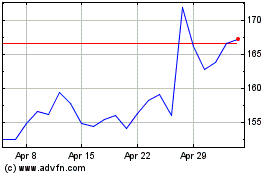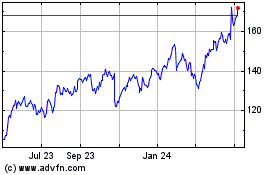By Dustin Volz and Deepa Seetharaman
U.S. national-security officials traveled to Silicon Valley last
week to forge deeper ties with big tech companies in hopes of
better protecting the 2020 election from foreign intervention. It
didn't go entirely as planned.
At the meeting organized by Facebook Inc. at its headquarters in
Menlo Park, Calif., Shelby Pierson -- named over the summer to lead
the U.S. intelligence community's new election-threats group --
delivered a blunt message to the assembled executives: You need to
share more data with us about your users.
The executives and other U.S. officials in the room were caught
off guard by Ms. Pierson's assertion, according to people in
attendance or briefed on the conversation. After a tense moment,
another official explained that privacy law limited what
social-media platforms could hand over to spy agencies.
A Twitter Inc. executive then offered a rebuke: The Trump
administration was failing to share enough information with tech
firms about election threats, not the other way around, the
executive told the room.
Publicly, the companies in attendance -- Facebook, Alphabet
Inc.'s Google and YouTube, Twitter, and Microsoft Corp. -- said the
daylong meeting was constructive.
But privately, some tech staffers and U.S. officials found the
exchange troubling, people familiar with the meeting said, adding
that it was unusual to see government officials contradict one
another so openly. Some said they worried it could undo some of the
progress made to forge a more unified front against the scourge of
foreign disinformation since, according to the U.S., Russia
unleashed bots and trolls on social media during the 2016
election.
Moscow interfered in "sweeping and systemic fashion" in the 2016
election in an effort to boost then-candidate Donald Trump's
chances, according to the findings of former special counsel Robert
Mueller. Moscow has denied election interference.
In a statement, a senior U.S. intelligence official said the
meeting with Ms. Pierson, who works under the Office of the
Director of National Intelligence, was "collectively viewed as a
positive step" toward continued collaboration.
"The invitation from our industry partners to discuss our shared
commitment to free and fair elections represents an important
signal of forward progress," the official said. "It is vital we
have open and honest conversations about what government and
industry can learn from each other to better understand the tactics
and intentions of our adversaries seeking to undermine our
democratic process, while safeguarding the privacy and civil
liberties of users."
A Twitter spokeswoman declined to comment.
Technology companies and various federal agencies have taken
strides to increase collaboration on addressing foreign
interference since the last presidential election. Those
improvements paid off during the 2018 midterms, when Facebook and
other platforms dismantled small networks of suspected
foreign-backed disinformation accounts based on tips from the
Federal Bureau of Investigation.
But the progress hasn't always been easy. The tech giants remain
wary of appearing too cooperative with security agencies more than
six years after disclosures by former intelligence contractor
Edward Snowden showed how companies supported classified
surveillance programs.
The FBI, Department of Homeland Security and intelligence
agencies, meanwhile, have sought to cajole social-media firms into
more actively policing their networks while sharing more
information about what they find, even as regulatory agencies slap
companies with record-setting billion-dollar fines for privacy
violations. The Federal Trade Commission, the Justice Department
and state law-enforcement officials also have recently launched
various antitrust probes into Facebook and Alphabet.
"I'm going to guess that both sides think the other is still
holding out on them," said Adam Segal, author of a book on the
relationship between Silicon Valley and Washington and the director
of the digital and cyberspace policy program at the Council on
Foreign Relations. "They're both under significant pressure to make
sure [2016] doesn't happen again."
Some people familiar with the exchange last week involving Ms.
Pierson said it reflected a healthy friction between government and
the private sector and that the most important thing is that the
two sides are hashing out issues 14 months before voters go to the
polls. Before 2016, there was virtually no dialogue about foreign
election interference on social media, these people said.
Amid the fallout prompted by 2016, several government agencies
have created new efforts to fight foreign election interference.
FBI Director Christopher Wray created a Foreign Influence Task
Force in 2017 consisting of counterintelligence and cybersecurity
personnel to tackle the threat posed by Russia and other hostile
foreign nations seeking to use social media or other means to
influence U.S. domestic politics or amplify societal divisions. The
National Security Agency and U.S. Cyber Command created a Russia
Small Group, recently made permanent, that launched cyber
operations against the Kremlin-backed Internet Research Agency
during the 2018 midterms.
The companies also have sought to improve their systems for
finding and eliminating disinformation.
Facebook in particular has become better equipped to respond to
disinformation campaigns, said Nathaniel Persily, a Stanford
University professor who studies election integrity. The company
has developed machine-learning algorithms to identify inauthentic
behavior, has placed restrictions on political advertising and has
regularly taken down clusters of accounts that it has associated
with information operations. "The capacity of the tech firms is
dramatically different from what it was in 2016," he said.
Still, barriers remain when it comes to information sharing, Mr.
Persily said. "They can't just turn over all of Facebook's data and
Twitter and Google's data to the government."
April Doss, a former intelligence lawyer at the National
Security Agency, said swapping information about election
disinformation is far more challenging than traditional
partnerships established to share intelligence about more
conventional cyber threats, which raised fewer privacy concerns and
involved more neatly defined adversaries.
"This is such a complicated space," said Ms. Doss, who served as
senior counsel for the Senate Intelligence Committee's Russia
investigation until last year and is now a partner at Saul Ewing
Arnstein & Lehr LLP. "Our traditional models of public-private
interaction really don't have a template for how to handle
this."
Questions have persisted about whether the platforms have done
enough to prepare for 2020, or if the Trump administration has
focused enough on the problem. The Senate Intelligence Committee is
expected to release a report in coming weeks reviewing Russia's
disinformation campaign in 2016 and recommending ways to improve
responses for future elections, according to a congressional
aide.
--Robert McMillan contributed to this article.
Write to Dustin Volz at dustin.volz@wsj.com and Deepa
Seetharaman at Deepa.Seetharaman@wsj.com
(END) Dow Jones Newswires
September 13, 2019 14:50 ET (18:50 GMT)
Copyright (c) 2019 Dow Jones & Company, Inc.
Alphabet (NASDAQ:GOOGL)
Historical Stock Chart
From Mar 2024 to Apr 2024

Alphabet (NASDAQ:GOOGL)
Historical Stock Chart
From Apr 2023 to Apr 2024
